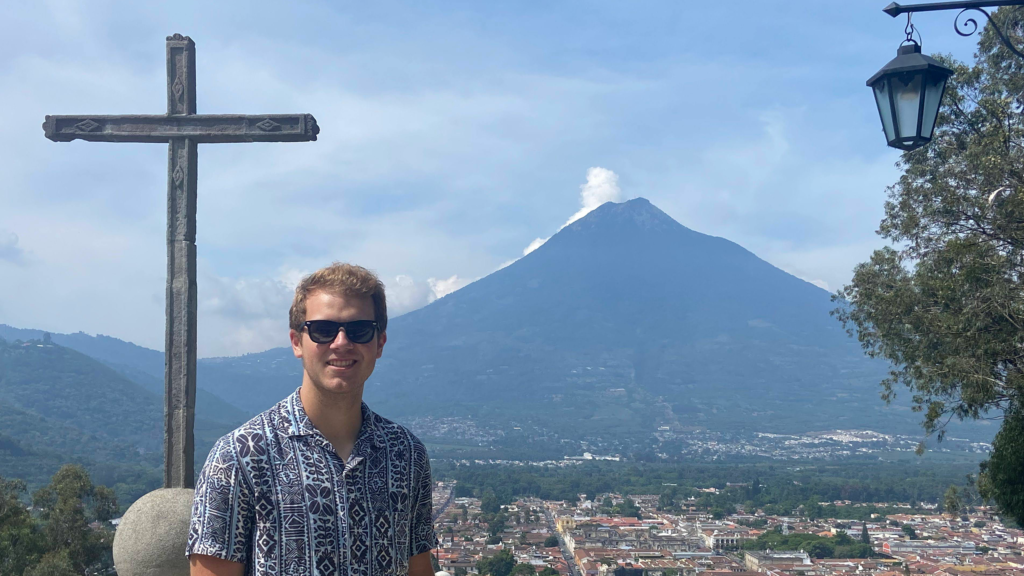I RECENTLY TOOK a trip to Guatemala, as a delegate with my hometown church. It was a mission trip, in which the common question asked was, “What are you guys gonna build?” When people hear about a mission trip, they automatically assume delegates are building houses.
Our delegation’s reply, though?
We’re building relationships.
By doing so, the idea was that not only would our Guatemalan friends share with us their culture, but we’d share with them ours. We played our American music, sung in Spanish; they taught us how to bake their bread, Guatemalan-style. That’s just a small example of our experiences.
Upon reflecting, I’m reminded of Pulp Fiction (thanks to my self-proclaimed talent of bringing movies into everything). When Vincent Vega returns from Europe, he’s marveled at the little differences from America. In Paris, he says, “You know what they call a quarter-pounder with cheese? . . . A roy-al with cheese.” They ain’t got the metric system! Funny enough, I didn’t stop into the McDonald’s in Guatemala, but I did look it up: They call it the Cuatro de Libra con Queso. How cool!
And so, especially with my trip to Guatemala, I am myself marveled at the differences between us and them.
There are, of course, distinct differences—ones we all picked up on very quickly. In America, for example, we drive on the right side of the road. In Europe, the left. But in Guatemala, you might as well forget that sides of the road even exist. But then there were those subtle differences, which would’ve gone overlooked had it not been for an open mind.
At the markets, men and women kindly guided us into their stores: Bienvienidos, adelante! they’d say, which meant Welcome, come in! Children sat and played with nothing but their imaginations. The atmosphere was hot and sticky, not a favorable place to just relax. But this was their way of making a living.
Sometimes, I’d catch a market vendor shutting their eyes, probably just catching up on the little sleep they got. It reminded me that we as Americans are so wrapped up in this hustle culture (and our subsequent riches) that we forget the simple pleasures of living. Whereas Americans continue to accumulate riches in money and materials, these market vendors merely accumulate their day’s meal, if even that. But they’re happy. Not once did I see a frown on anyone’s faces.
The value of our dollar is worth, to them, the value of their being.
At the elementary school we visited, children packed into their classrooms like sardines. Their playground was a flat, concrete slab, where they played games with each other. There was no technology, other than the dim, yellow lighting—and yet, they were happy.
I think back to my experiences in school, where my peers would arrive tired, unfocused, and with a hint of rebellion. (I was also guilty of such behaviors.) But in Guatemala, every student was lively, enthusiastic, and ready to learn. Education isn’t handed to them like it is to us, yet they all possessed a beautiful smile.
The same goes for the young ladies at the Milagro School—a women’s school for those seeking an education, not merely of academics, but of life. Most of the young women come from villages, where education is minimal. They arrive with the belief that they can, and they’re right. In the school’s short existence, so far, women have gone on to becoming nurses, for example.
Not only was I inspired by the ladies’ bravery and courage, but I was also impacted by their simplicity. They possessed hardly anything but each other. And yet, I never saw a frown on their faces.
I concede, then, that the more materials we possess, the less we truly have. By contrast, the less materials our Guatemalan friends have, the happier and more content they are. Whereas we in America are rich, Guatemala is wealthy—not in mere Quetzals (as they call their currency), but in compassion, wholesomeness, and love.
Eye-opening is an understatement. Guatemala made me realize how blessed I am, and how fortunate we all are.
And now I’m hungry for a Cuatro de Libra . . . hold the queso this time.
